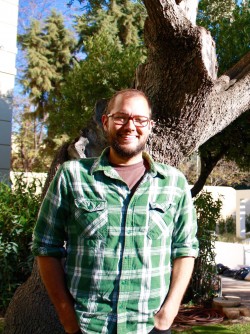Meet a Member: Brandon Braun

Brandon Braun is a Regular Member at the American School of Classical Studies at Athens. He is currently getting his PhD at the Cotsen Institute of Archaeology at the University of California, Los Angeles.
Q: What is your academic area of interest?
A: Archaeology. I’m in an interdepartmental program at UCLA, but two of my advisors (Sarah Morris and John Papadopoulos) and another member of my committee (Kathryn Morgan) are in the Classics department, so I’m also focused on classical archaeology.
For my dissertation I’m looking at how monuments created spaces that were linked to memories, and how a memory of a place can be influenced by the environment and how subsequent activities can augment, or even hide, memories. Right now I’m specifically looking at trophy monuments and how they create spaces, and the texts that refer back to them and show how people thought about spaces.
Q: And what got you interested in classical archaeology?
A: As an undergrad I took Ancient Greek my sophomore year. In the first week we learned the alphabet and I wrote the Xi (ξ) and that was just so fun. That same year, my professor suggested archaeology as a possible career path. I was originally a math major.
Q: Had you been to the Greece before this year?
A: Yes I had. I went as an undergraduate for a study abroad over the summer in 2010. In 2013 I did the summer session here at the ASCSA. I’ve done two seasons at the agora here in Athens as one of the summer volunteers. And for the last three years I’ve been at the Ancient Methone Archaeological Project.
Q: What brought you to the Regular Year program at the ASCA?
A: For part of my dissertation I’m looking at archaeological sites and how they develop though time. So I wanted to visit these sites and see what I could see that I couldn’t get from a book. I also really liked my experience in the summer session, the vibrancy of the American School community, and the history of the place.
It’s been really valuable seeing things that were new to me, because I’ve been to Greece 5 times already in the past few years, but its always cool to find and see things I hadn’t seen. For example I’d never been to western Greece, and I don’t really know about the more recent history of Greece. Seeing more modern cities such as Ioannina and Patras has been really educational.

Q: What was your favorite report that you gave?
A: My report at Bassae was really interesting— it’s such an interesting site, with the sculpture and architecture, and then the important modern history like its UNESCO status and the tent that’s on it now. And it was interesting to think about how that tent is preserving the building but also removing the site from its original context. It was really unique to think about all that at once while on the site.
Q: What is your favorite restaurant in Athens?
There’s one that just opened up that’s down the street across from the hospital called Madam Sousou, and they’re pretty good and they’re really close. They have chicken and haloumi and that’s my jam.
Q: What is your favorite place you’ve visited in Greece?
A: Aegina is one of my favorite places. My first time here it was just a really good day. I remember going though the fish market and then seeing cats trying to get at the fish and it’s just a good memory. I had a lot of good pistachios.
Q: If you were a Greek god or goddess which one would you be?
A: So I think I’d be Herakles. Because he kind of goes crazy, and I feel like that’s part of the human experience that’s important. But he’s also sometimes a god. It’s a lot of pressure to be Herakles, he’s such an important Greek figure. Also the Disney movie is pretty great.
Q: What do you get from your experience at the ASCSA?
A: I get the opportunity to be in Athens in this big community of other classical scholars, other people that like the ancient world. With the Regular Year program in particular I get to see all these amazing sites I usually wouldn’t get to see. When you’re at these sites you’re confronted with more than just the classical range of history and its helpful to think about the depth of time in places— you’re not just seeing one moment in time but also a lived space.